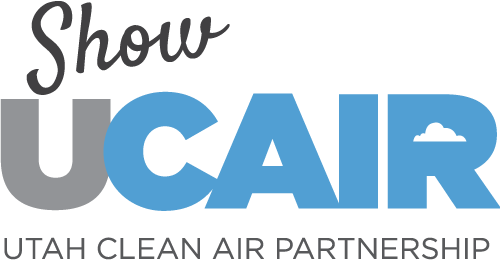UCAIR Funding Opportunities
Since 2013, the UCAIR Grants Program has encouraged Utah’s businesses, government entities and nonprofit organizations to bring forward creative and innovative ideas. The goal of the UCAIR Grants Program is to reduce emissions of criteria pollutants that cause Utah’s poor air quality. Applicant organizations may propose projects in any area that may decrease criteria pollutants within our State.
Thank you for your interest in the UCAIR Grants Program!
Applications for the upcoming 2023-2024 grant cycle will open in June.
More information on this year's Request for Proposals will be coming soon.
If you would like to stay updated when next year’s application opens or for other funding opportunities, please follow the link below.
2022-2023 Request for Proposals
The UCAIR Grant Selection Committee is requesting applications for projects addressing any of the four areas listed below. For the 2022-2023 UCAIR Grant cycle, applications that do not fall under one of these areas of interest will not be considered.
- Reduction of emissions from area sources that contribute to both wintertime inversion and summertime ozone seasons, including but not limited to residential homes and commercial sources such as, dry cleaners, print shops, gas stations and auto body paint shops.
- Projects and programs specifically targeting summertime precursor emissions contributing to ozone
- Programs utilizing emerging technologies that result in measurable emissions reductions.
- Reduction of emissions in underserved areas:
- Socioeconomically disadvantaged communities.
- Areas of opportunity (geographic, industry, sector) that have not received adequate financial support.
AREAS NOT ELIGIBLE FOR FUNDING
While UCAIR is supportive of efforts in the areas below, we recognize that they are being addressed through other funding mechanisms, or do not fall within our mission. Significant state and private funding have recently been allocated to support EV infrastructure and air quality sensors, so UCAIR will focus its limited grant resources on other pursuits. Following the guidance of the UCAIR Grant Selection Committee, this year’s funding will not be awarded to the following areas:
- Installation and/or support of air quality measurement instruments
- Electric vehicle charging infrastructure
- General education and awareness, including toolkits
- Political speech
Guidelines and Review Criteria
- Grant funds must be used to reduce the criteria pollutants that degrade Utah’s air quality, either directly or through longer term effects related to social change.
- Funding will be prioritized by the amount of actual emissions reduction anticipated from the projects.
- Proposals must delineate the metrics and/or performance standards that will be used to quantify outcomes and/or emissions reductions for technical grants.
- Projects that can be replicated to create additional emissions reductions will be given priority for funding.
- The size of proposals varies considerably. The average amount of a UCAIR Grant is $23,000. Larger projects will be reviewed rigorously and must demonstrate commensurate emissions reductions.
- It is anticipated projects will be of one-year duration.
- Applicants will be limited to private-sector, public-sector or nonprofit organizations. Grants will not be awarded to individuals.
- Grants will be considered to for-profit organizations only if the project furthers UCAIR’s charitable purpose or results in direct, measurable emissions reductions.
- For-profit grants will be capped at 50% of the total project cost or a maximum of $15,000. For-profit organizations will be expected to contribute matching funds.
- UCAIR Grants cannot be used for projects that include lobbying, political speech or any other type of political activity.
- UCAIR Grants are not available for strategic, start up or investment capital. Nor are UCAIR Grants intended to support the applicant organization’s infrastructure
- All grants will be subject to an agreement between UCAIR and the grant recipient.
- UCAIR Grant funds will be dispersed via check directly to the applicant organization.
UCAIR Grant Process Overview
- Applicants are encouraged to review the full 22-23 RFP, which details criteria and process for submitting a grant request.
- Applicants should then submit a Letter of Intent form (download here), which outlines the idea proposed and provides for further discussion between the applicant and UCAIR’s Grant Selection Committee before a full application is prepared. Completed LOI forms should be submitted to grants@ucair.org on or before July 29, 2022.
- If the idea is approved for further consideration, applicants should then submit a full UCAIR Grant Application Form. A full application form will be provided to LOI applicants who are asked to move forward.
- When submitting a complete UCAIR Grant Application Form, please be sure to included all requested items, follow all instructions and use forms in the format they are provided. Incomplete or improperly completed applications will be disqualified or returned to the applicant for revision before the application will be considered for funding.
Grant Timeline
- Monday, June 12, 2023 – Grant Application Opens
- Friday, July 28, 2023 – Letter of Intent Form due
- Friday, August 25, 2023 – Responses provided to prospective applicants
- Friday, September 29, 2023 – Application Form due
- Friday, November 17, 2023 – Grant Recipient Announcement
Other Funding
Clean Fuel Vehicle Tax Credit
The State of Utah provides a tax credit for motor vehicles that meet certain air quality and fuel economy standards.
Alternative Fuel Heavy-Duty Vehicle Tax Credit
The State of Utah provides a tax credit for the qualified purchase of a natural gas, a 100% electric or hydrogen-electric heavy-duty vehicle (category 7 or 8 vehicle) that has never been titled or registered.
BizHelp
The Department of Environmental Quality’s (DEQ) Business Assistance Program, BizHelp, provides information on pollution prevention practices, environmental permits, sustainability resources, and the Clean Utah business recognition program.

